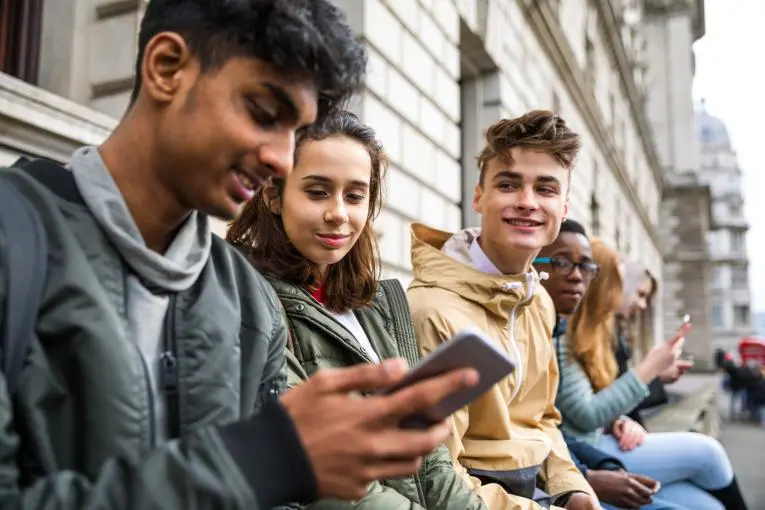
Surviving and thriving online: What skills do children need?
By Jacqui Ward, University of Strathclyde, Scotland
08 March 2024
"I like Andrew Tate!" said my teenage son over dinner. Several responses flashed through my mind:
The parent: "WHAT?? No you don't. No more phone for you."
The woman: "WHAT?? How can you like someone who is a misogynist and currently under arrest for exploiting women?"
The psychologist: "Really? Tell me more."
Luckily, the psychologist won the race to respond! And so our conversation began. We explored concepts of misogyny, misinformation and the importance of critical thinking. However, how could a kind, emotionally literate young man be swayed by Andrew Tate? And what about children who were not having these conversations with their families?
Children have access to social media from a young age. In the UK, 88 per cent of children have access to smartphones by 12 years old (Ibettson, 2020). However, the impact social media has on children is not clearcut. There are benefits and risks (American Psychological Association, 2023).
Therefore a nuanced approach is needed, similar to that described by Kaye (2022) & Livingstone (2016). An ecological perspective ensures thought is given to all elements impacting children as social beings in the cyberworld. There are influences at individual, family, community and cultural levels and how these intersect can be different for each child. Accessibility, use, software, hardware, motivations and perceptions of use all influence the effect (Kaye, 2022).
Mitigating the risks
So how can children benefit from digital opportunities whilst mitigating risks? What skills do they need to survive and thrive online? Similar to the real world, children need 'softer skills' to successfully navigate their digital lives. Nasambeni & Vosloou (2019) developed a definition for digital literacy which encompasses the softer skills children need:
"Digital literacy refers to the knowledge, skills and attitudes that allow children to flourish and thrive in an increasingly global digital world, being both safe and empowered, in ways that are appropriate to their age and local cultures and contexts." (p32)
There are various competency frameworks which effectively describe these softer skills and are relevant to children, including the European Commission's Digital Competence Framework for Citizens (DIgComp) and Digital Kids' Asia-Pacific Competence Framework.
However, further evidence is needed. We need to take a developmental approach to the maturation of these skills and how age, stage and gender influence their development. Furthermore, we need to reconsider current reliance on self-reporting in assessment. Existing evidence suggests people overestimate their abilities when self-reporting (Hadad et al., 2023).
To address this, a move towards more unbiased, varied methodologies is vital e.g. performance-based evaluations, social media trace data. These would add to the current evidence base, providing further understanding of digital skills development.
This information could be used to support parents/ teachers have developmentally appropriate, respectful conversations with children about their digital lives, exploring their online discoveries. However, it is important to recognise children's involvement in creating the supports they need. The genie is out of the bottle, the majority of children have smartphones, so we need to explore together the skills and approaches needed to, not only, survive but thrive online.
----------------------------------------------------------------------------------------------------------------------------
References:
American Psychological Association. (2023). Health Advisory on Social Media Use in Adolescence. Available from American Psychological Association Health Advisory on Social Media Use in Adolescence (apa.org)
Ibbetson, C. (2020). How many children have their own tech? YouGov. Available from How many children have their own tech? | YouGov
Hadad, S., Watted, A., & Blau, I. (2023). 'Cultural background in digital literacy of elementary and middle school students: Self-appraisal versus actual performance'. Journal of Computer Assisted Learning, 39 (5), 1591-1606. https://doi.org/10.1111/jcal.12820
Kaye, L.K. (2022). Issues and debates in cyberpsychology. Open University Press.
Livingstone, S. (2016). A framework for researching Global Kids Online: Understanding children's wellbeing and rights in a digital age. London: Global Kids Online. Available from: www.globalkidsonline.net/framework
Nasambeni, F. & Vosloo, S. (2019). Digital literacy for children: Exploring definitions and frameworks. In New York: UNICEF Office of Global Insight and Policy. Available from: (PDF) Digital literacy for children: exploring definitions and frameworks (researchgate.net)